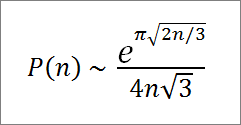Copyright © Had2Know 2010-2026. All Rights Reserved.
Terms of Use | Privacy Policy | Contact
Site Design by E. Emerson
Integer Partition Function Calculator
Integer partitions count the number of ways a positive integer n can be written as the sum of positive integers less than or equal to n, ignoring the order of summands.
The integer partition function is often denoted by P(n). For example, P(7) = 15 because there are 15 ways to write 7 as a sum:
7
6+1
5+2
4+3
5+1+1
4+2+1
3+3+1
3+2+2
4+1+1+1
3+2+1+1
2+2+2+1
3+1+1+1+1
2+2+1+1+1
2+1+1+1+1+1
1+1+1+1+1+1+1
Properties of P(n)
For mathematical convenience, P(0) is defined as 1. While there is no simple explicit formula for computing P(n), there is a recursion formula that allows you to calculate P(n) as long as you know the values of P(i) for i < n. The recursive formula isP(n) = Σ (-1)k+1[P(n - k(3k-1)/2) + P(n - k(3k+1)/2)],
where k ranges from 1 to n. Because P(b) = 0 for all negative integers b, many of the terms in this series vanish. As an example, let's use the above formula to compute P(13) and P(15).
P(13) = P(13-1) + P(13-2) - P(13-5) - P(13-7) + P(13-12) + P(13-15) - ...
= P(12) + P(11) - P(8) - P(6) + P(1) + P(-2) - ...
= 77 + 56 - 22 - 11 + 1 + 0 - ....
= 101.
P(15) = P(15-1) + P(15-2) - P(15-5) - P(15-7) + P(15-12) + P(15-15) - ...
= P(14) + P(13) - P(10) - P(8) + P(3) + P(0) - ...
= 135 + 101 - 42 - 22 + 3 + 1 - ....
= 176.
This is sometimes known as the pentagonal number recursion formula since numbers of the form k(3k-1)/2 and k(3k+1)/2 are generalized pentagonal numbers.
Another recursive formula for the integer partition function is
nP(n) = Σ σ₁(n-k)P(k),
where k = 0,...,n-1 and σ₁ is the divisor function. As another example, we can use this formula to compute P(7).
7P(7) =
σ₁(7)P(0)+ σ₁(6)P(1) + σ₁(5)P(2) + σ₁(4)P(3) + σ₁(3)P(4) +σ₁(2)P(5) + σ₁(1)P(6)
= 8*1 + 12*1 + 6*2 + 7*3 + 4*5 + 3*7 + 1*11
= 8 + 12 + 12 + 21 + 20 + 21 + 11
= 105
Since 7P(7) = 105, P(7) = 105/7 = 15.
Asymptotic Formula
For large values of n, P(n) can be approximated with the asymptotic formula
For example, the exact value of P(200) is 3,972,999,029,388. With the asymptotic formula, the approximate value is
e36.2759873/1385.6406461 = 4,100,251,494,852.9.
© Had2Know 2010
